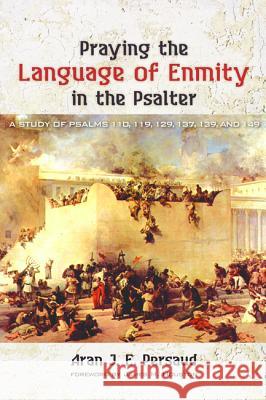Praying the Language of Enmity in the Psalter » książka
Praying the Language of Enmity in the Psalter
ISBN-13: 9781498289610 / Angielski / Miękka / 2016 / 266 str.
Praying the Language of Enmity in the Psalter
ISBN-13: 9781498289610 / Angielski / Miękka / 2016 / 266 str.
(netto: 121,11 VAT: 5%)
Najniższa cena z 30 dni: 125,78
ok. 16-18 dni roboczych.
Darmowa dostawa!
How is it possible to hold a New Testament ethic to love one's enemies and pray for their physical infliction, shame, death, and suffering of family members? And yet, the Psalter, the prayer book of the Church, contains such prayers. In modern times, the Church has adopted a semi-Marcionite attitude towards these troubling texts, excluding whole psalms or parts from liturgies and private use. But as the age of ""terror"" dawns upon us, we are finding that these texts speak of unchanging realities that perhaps the ancients were abler to understand than moderns. Two great wars and a multitude of ideologies proved in the last century that the intellect cannot prevent these irrational impulses of destruction, and post-modern societies, of the present century, with their multitude of voices really offer no voice to counter moral evil. This study of six psalms with graphic language of enmity seeks to help the reader overcome shallow views of the mystery of evil, cultural blinkers of the use of language, and even personal prejudices. It attempts to recover the complete prayer book of the Church, as it once was, Israel's prayer book. ""This excellent study helpfully focuses our attention on a long-neglected theme in the book of Psalms, by way of careful examination of both well-known and less well-known texts. Pushing beyond standard form-critical categories, Persaud presents these psalms to the reader as important resources for the Church in its ongoing struggle in prayer with recalcitrant moral evil."" --Iain Provan, Marshall Sheppard Professor of Biblical Studies, Regent College ""It is often not easy for us to call someone an enemy, even to ourselves. Didn't Jesus ask us to 'love our enemies?' So how might we understand prayers which are meant to be useful to us and yet which speak about enemies? Dr. AranPersaud gives detailed attention to a careful selection of Psalms which use 'enemy' language, and provides some insightful conclusions. Well worth a read."" --Kathleen Rochester, Senior Lecturer, Northwest University, RSA; Adjunct Faculty, SAIACS, India, STS Malaysia, LBC Latvia; Author of Prophetic Ministry in Jeremiah and EzekielandIsrael's Lament ""Aran Persaud studies the problematic topic of the enemies in the Psalms and the question of whether Christians can sing (or pray) these psalms.He investigates the psalms as canonical, normative prayer in order to move towards developing a theology of God's just dealing with people, and his people in particular. This is a very important contribution to the study of these problematic Psalms."" --Herrie van Rooy, Professor Emeritus, Faculty of Theology, North-West University, Potchefstroom, South Africa Aran J. E. Persaud is professor of Old Testament at Ryle Theological College in Ottawa, Canada, and visiting professor at Anyang University, South Korea."
How is it possible to hold a New Testament ethic to love ones enemies and pray for their physical infliction, shame, death, and suffering of family members? And yet, the Psalter, the prayer book of the Church, contains such prayers. In modern times, the Church has adopted a semi-Marcionite attitude towards these troubling texts, excluding whole psalms or parts from liturgies and private use. But as the age of ""terror"" dawns upon us, we are finding that these texts speak of unchanging realities that perhaps the ancients were abler to understand than moderns. Two great wars and a multitude of ideologies proved in the last century that the intellect cannot prevent these irrational impulses of destruction, and post-modern societies, of the present century, with their multitude of voices really offer no voice to counter moral evil. This study of six psalms with graphic language of enmity seeks to help the reader overcome shallow views of the mystery of evil, cultural blinkers of the use of language, and even personal prejudices. It attempts to recover the complete prayer book of the Church, as it once was, Israels prayer book. ""This excellent study helpfully focuses our attention on a long-neglected theme in the book of Psalms, by way of careful examination of both well-known and less well-known texts. Pushing beyond standard form-critical categories, Persaud presents these psalms to the reader as important resources for the Church in its ongoing struggle in prayer with recalcitrant moral evil."" --Iain Provan, Marshall Sheppard Professor of Biblical Studies, Regent College""It is often not easy for us to call someone an enemy, even to ourselves. Didnt Jesus ask us to love our enemies? So how might we understand prayers which are meant to be useful to us and yet which speak about enemies? Dr. Aran Persaud gives detailed attention to a careful selection of Psalms which use enemy language, and provides some insightful conclusions. Well worth a read.""--Kathleen Rochester, Senior Lecturer, Northwest University, RSA; Adjunct Faculty, SAIACS, India, STS Malaysia, LBC Latvia; Author of Prophetic Ministry in Jeremiah and Ezekiel and Israels Lament""Aran Persaud studies the problematic topic of the enemies in the Psalms and the question of whether Christians can sing (or pray) these psalms. He investigates the psalms as canonical, normative prayer in order to move towards developing a theology of Gods just dealing with people, and his people in particular. This is a very important contribution to the study of these problematic Psalms.""--Herrie van Rooy, Professor Emeritus, Faculty of Theology, North-West University, Potchefstroom, South AfricaAran J. E. Persaud is professor of Old Testament at Ryle Theological College in Ottawa, Canada, and visiting professor at Anyang University, South Korea.











